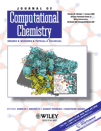
JOURNAL OF COMPUTATIONAL CHEMISTRY
Scope & Guideline
Catalyzing Collaboration in Computational Chemistry
Introduction
Aims and Scopes
- Computational Methodology Development:
The journal publishes papers on the development and refinement of computational methods, including density functional theory (DFT), molecular dynamics (MD), and quantum mechanics/molecular mechanics (QM/MM) approaches, aimed at improving accuracy and efficiency in chemical modeling. - Machine Learning Applications in Chemistry:
Recent publications highlight the integration of machine learning techniques with traditional computational methods to predict molecular properties, optimize reaction pathways, and enhance drug discovery processes. - Mechanistic Studies and Reaction Pathways:
The journal features studies that provide mechanistic insights into chemical reactions, including transition state theory, reaction dynamics, and energy profile calculations, often employing advanced computational techniques. - Material Science and Nanotechnology:
Research articles focus on computational investigations of materials and nanostructures, exploring their electronic, optical, and thermodynamic properties to facilitate advancements in materials science and nanotechnology. - Biomolecular Simulations and Drug Design:
The journal emphasizes the computational modeling of biological systems, including protein-ligand interactions, enzyme mechanisms, and drug design strategies, contributing to the fields of medicinal chemistry and biochemistry. - Spectroscopy and Photophysics:
Papers on theoretical predictions and simulations of spectroscopic properties, including UV-Vis, NMR, and IR spectra, are common, providing insights into the electronic structure and dynamics of molecular systems.
Trending and Emerging
- Integration of Artificial Intelligence and Machine Learning:
There is a significant increase in publications that explore the application of AI and machine learning techniques in computational chemistry, including drug discovery, property prediction, and reaction optimization, showcasing a trend towards data-driven methodologies. - Advanced Materials and Nanostructures:
Research focusing on the computational design and characterization of advanced materials, particularly nanomaterials and two-dimensional materials, is on the rise, aligning with ongoing advancements in materials science and nanotechnology. - Quantum Computing Applications:
Emerging research on the application of quantum computing to tackle complex chemical problems is gaining traction, indicating a shift towards utilizing next-generation computational resources for significant breakthroughs in chemistry. - Dynamic and Time-Resolved Studies:
There is a growing trend towards dynamic simulations and time-resolved studies that investigate molecular processes over time, providing insights into reaction mechanisms and molecular interactions in real-time. - Interdisciplinary Approaches:
An increase in interdisciplinary studies that combine computational chemistry with fields such as biology, materials science, and environmental science is evident, reflecting the collaborative nature of contemporary research.
Declining or Waning
- Classical Force Field Approaches:
There has been a noticeable decline in the publication of studies focused solely on classical force field methods for molecular dynamics simulations, as researchers increasingly turn to hybrid and more sophisticated QM/MM approaches. - Basic Quantum Chemistry Calculations:
The prevalence of straightforward quantum chemistry calculations using traditional methods has decreased, likely due to the rise of more advanced and hybrid methods that provide greater accuracy and efficiency. - Static Structural Analysis:
Research centered around static structural analysis of small molecules appears to be waning, as the field shifts towards dynamic and time-resolved studies that consider molecular flexibility and interactions. - Simple Benchmark Studies:
There is a diminishing trend in the publication of simple benchmark studies that do not incorporate advanced computational techniques, as the field increasingly values comprehensive studies that integrate multiple approaches. - Traditional Solvation Models:
The focus on traditional implicit solvation models has decreased, with more researchers exploring advanced methods that incorporate explicit solvent interactions and advanced sampling techniques.
Similar Journals

Computational and Theoretical Chemistry
Empowering Scholars with Open Access to Cutting-Edge ResearchComputational and Theoretical Chemistry, published by ELSEVIER, stands at the forefront of interdisciplinary research in the realms of computational chemistry, theoretical physics, and biochemistry. With its ISSN 2210-271X and E-ISSN 1872-7999, the journal has established a significant presence in the academic community since its inception. Covering innovative computational methodologies and theoretical advancements, it addresses critical issues in condensed matter physics and molecular biochemistry, providing a rich resource for scholars and industry professionals alike. The journal enjoys a respectable impact factor and ranks notably in several Scopus categories, making it a vital platform for disseminating high-quality research. It adopts an open-access model, facilitating wider readership and engagement, which is essential for fostering collaborative innovations in the scientific landscape. As it continues to evolve from 2011 to 2024, Computational and Theoretical Chemistry is committed to advancing knowledge and promoting insightful discussions within the scientific community.
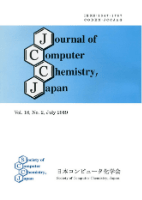
Journal of Computer Chemistry-Japan
Exploring Innovative Solutions for Complex Chemical ChallengesJournal of Computer Chemistry-Japan, published by SOC COMPUTER CHEMISTRY, JAPAN, is a dedicated platform for researchers and professionals in the interdisciplinary fields of computational chemistry and chemical informatics. Though the journal does not currently provide open access, it maintains a rigorous selection process for contributions, ensuring the publication of high-quality, peer-reviewed research. With a focus on advancing computational methods and techniques to solve complex chemical problems, the journal aims to bridge the gap between theoretical chemistry and practical applications, making it an invaluable resource for academics and industry professionals alike. As the complexity of chemical systems continues to rise, the relevance of computational approaches in material science, drug discovery, and molecular modeling has never been more critical. Researchers are encouraged to engage with the contents of this journal, which showcases innovative studies, methodologies, and discussions relevant to the evolving landscape of computer-aided chemistry.
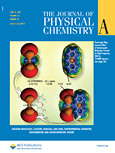
JOURNAL OF PHYSICAL CHEMISTRY A
Exploring the depths of physical and theoretical chemistry.Journal of Physical Chemistry A, published by the American Chemical Society, serves as a leading platform for disseminating high-quality research in the fields of physical and theoretical chemistry. With an ISSN of 1089-5639 and E-ISSN of 1520-5215, this journal maintains a rigorous standard, demonstrated by its position in the Q2 category for both physical and theoretical chemistry as well as miscellaneous medicine within its 2023 category quartiles. As part of the greater ACS network, it operates with a solid Scopus rank of 76/189, placing it within the 60th percentile, emphasizing its credibility and impact in the chemistry community. The journal's objective is to enhance the understanding of molecular phenomena through innovative experimental and computational approaches, making it essential reading for researchers, professionals, and students seeking to advance their knowledge and contribute to scientific discussion. With additional open access options, the Journal of Physical Chemistry A continues to foster collaboration and the sharing of ideas in the vibrant scientific landscape of the United States and beyond.
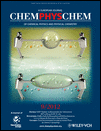
CHEMPHYSCHEM
Pioneering Research at the Intersection of Chemistry and PhysicsCHEMPHYSCHEM, published by WILEY-V C H VERLAG GMBH in Germany, stands as a pivotal resource for researchers and professionals in the fields of Atomic and Molecular Physics, as well as Physical and Theoretical Chemistry. With a commendable impact across its converged years from 2000 to 2024, the journal is categorized in the second quartile (Q2) for both aforementioned fields according to the 2023 metrics, underscoring its significance in advancing scientific dialogue and research. CHEMPHYSCHEM is committed to disseminating high-quality, peer-reviewed research articles that delve into the intricate interplay between chemistry and physics, making it an essential read for students and experts alike. The journal does not currently offer open access options, allowing for focused scholarly discussions that cater to the academic community's needs. As reflected in its Scopus rankings, CHEMPHYSCHEM maintains respectable standings, ranking #84/224 and #90/189 in its respective categories, demonstrating its commitment to high-impact research and innovation.
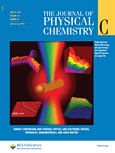
Journal of Physical Chemistry C
Charting new territories in nanotechnology research.The Journal of Physical Chemistry C, published by the American Chemical Society, stands as a pivotal resource in the realm of materials science and physical chemistry. With an impact factor reflecting its esteemed reputation, this journal showcases high-quality research spanning topics such as electronic, optical, and magnetic materials, as well as nanoscience and nanotechnology. Hailing from the United States, it operates without an open access model, yet its contributions are critical for advancing our understanding of surfaces, coatings, and films. Notably, the journal is classified in Quartile 1 (Q1) for several categories, underscoring its prominence in Physical and Theoretical Chemistry and related fields. Researchers, professionals, and students alike will find value in the comprehensive discussions and innovative research trends presented. The scholarly articles published from 2007 to 2024 not only drive forward scientific inquiry but also inform practical applications in various industries, making this journal an essential tool for anyone committed to excellence in the sciences.

JOURNAL OF MATHEMATICAL CHEMISTRY
Empowering Researchers with Cutting-Edge Mathematical ApproachesJOURNAL OF MATHEMATICAL CHEMISTRY is a prominent peer-reviewed journal published by Springer, dedicated to the field of mathematical chemistry. With an established history dating back to 1987, this journal serves as a vital platform for researchers to disseminate innovative findings and methodologies that combine the principles of mathematics with chemical science. Currently, it holds a commendable impact factor and ranks in the Q2 category for both applied mathematics and miscellaneous chemistry in 2023, showcasing its influence within these disciplines. The journal is indexed under Scopus, with notable rankings that place it in the top quartile among related works, ensuring high visibility and academic rigor. While access to its content is not open, the journal maintains a dedicated readership of professionals, researchers, and students eager to explore the computational and theoretical aspects of chemistry. The JOURNAL OF MATHEMATICAL CHEMISTRY continues to enrich the scientific community by fostering interdisciplinary collaboration and advancing quantitative approaches in chemical research.
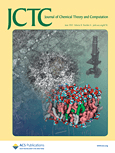
Journal of Chemical Theory and Computation
Transforming Theoretical Chemistry through ComputationThe Journal of Chemical Theory and Computation, published by the American Chemical Society, stands at the forefront of the multidisciplinary fields of computational chemistry and computer science applications. With an impressive impact factor and ranking in the top quartile (Q1) in both Physical and Theoretical Chemistry and Computer Science Applications, this journal serves as a vital platform for researchers and professionals seeking to publish cutting-edge research on computational methodologies and innovative theoretical approaches. Spanning from 2005 to 2024, the journal aims to disseminate high-quality studies that advance understanding of molecular systems and the development of computational techniques. Its esteemed reputation is reflected in its robust metrics, ranking #23 in Physical and Theoretical Chemistry and #101 in Computer Science Applications by Scopus, showcasing its significant influence in the academic community. While it does not currently offer open access, the journal remains accessible to a wide audience, making it an essential resource for those engaged in the evolving landscape of chemical theory and computation.

Advanced Theory and Simulations
Unveiling New Frontiers in Interdisciplinary Research.Advanced Theory and Simulations, published by WILEY-V C H VERLAG GMBH in Germany, stands at the forefront of interdisciplinary research in the realms of modeling, simulation, numerical analysis, and statistics. With a commendable impact factor reflected through its esteemed rankings—Q2 in Modeling and Simulation, Q1 in Multidisciplinary, Q2 in Numerical Analysis, and Q2 in Statistics and Probability—this journal is essential for academia and industry professionals alike who aim to deepen their knowledge and innovate within these dynamic fields. The journal has achieved notable Scopus rankings, with a 91st percentile in Mathematics: Statistics and Probability, emphasizing its critical role in advancing scholarly communication. Since its inception in 2018, Advanced Theory and Simulations has provided an open platform for researchers to share their findings and foster collaborative developments. Although it currently does not operate an open access model, the journal's commitment to rigorous peer review and quality ensures that published work remains highly reputable and impactful. This makes it a vital source of contemporary research for those engaged in theoretical and applied sciences, encompassing a broad range of applications and methodologies.
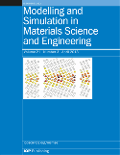
MODELLING AND SIMULATION IN MATERIALS SCIENCE AND ENGINEERING
Unveiling the Mechanics of Material PerformanceMODELLING AND SIMULATION IN MATERIALS SCIENCE AND ENGINEERING, published by IOP Publishing Ltd, serves as a vital resource for researchers, professionals, and students engaged in the multifaceted fields of materials science, condensed matter physics, and computational mechanics. Since its inception in 1992, this journal has been committed to advancing knowledge through high-quality research articles, reviews, and simulations that explore complex interactions within materials. With an impressive Scopus rank in multiple categories, including Q2 in Materials Science and Mechanics of Materials, it reflects its significant influence and relevance in the academic community. Though not an open-access journal, it provides critical insights and developments in modeling techniques and simulations aimed at improving material performance and understanding thermodynamic processes, making it an essential read for those at the forefront of materials innovation. As it continues to expand its scope and reach into 2024 and beyond, MODELLING AND SIMULATION IN MATERIALS SCIENCE AND ENGINEERING remains a key platform for disseminating groundbreaking research that shapes the future of the discipline.
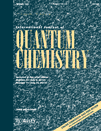
INTERNATIONAL JOURNAL OF QUANTUM CHEMISTRY
Advancing Knowledge in Quantum Chemical ResearchInternational Journal of Quantum Chemistry is a distinguished scholarly publication that has been at the forefront of advancements in the realm of quantum chemistry since its inception in 1967. Published by Wiley in the United States, this journal holds a significant place in the academic community, currently indexed in the Q3 quartile across various categories including Atomic and Molecular Physics, Condensed Matter Physics, and Physical and Theoretical Chemistry. With an ISSN of 0020-7608 and an E-ISSN of 1097-461X, the journal offers a platform for researchers and professionals to disseminate cutting-edge findings in quantum chemical research. While it operates under a traditional subscription model, the journal remains committed to enhancing the visibility of its contributions within the scientific community. With a convergence of research that spans from 1967 to 2024, the International Journal of Quantum Chemistry is pivotal for anyone looking to advance their understanding and application of quantum principles in chemistry, providing valuable insights into the microscopic interactions that govern matter and its properties.